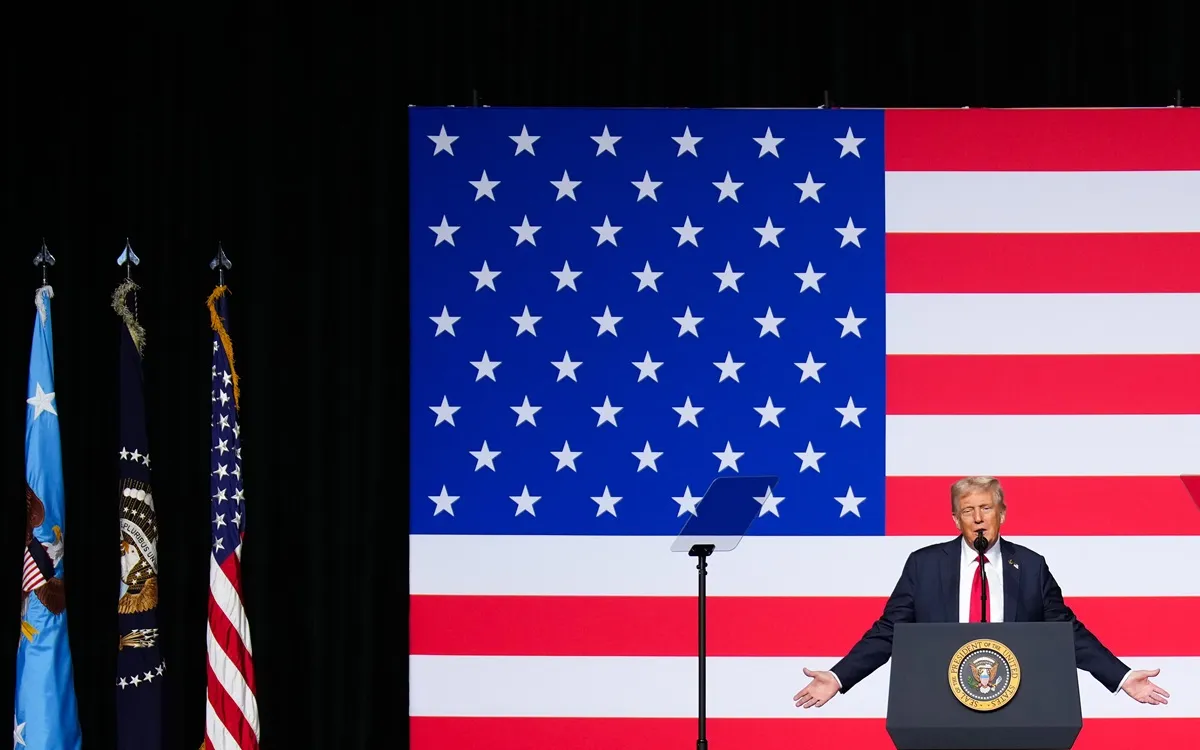
On Tuesday, California's elected officials expressed deep concern over President Donald Trump’s recent threats to deploy troops to Democratic strongholds like San Francisco, amidst what he termed a “war from within.” Speaking at an unusual gathering of top U.S. military leaders in Virginia, Trump called upon generals to defend the nation against an internal “invasion,” suggesting that cities governed by Democrats could serve as “training grounds” for the National Guard.
The president's comments drew swift condemnation from various Democratic leaders, including Governor Gavin Newsom and State Senator Scott Wiener. In a post on the social media platform X, Wiener criticized Trump’s rhetoric, stating, “Training the military to ‘quell civil disturbances’ is another step toward authoritarianism.” He further expressed that linking this military action to “the enemy from within” is particularly alarming, as it echoes the language used by Hitler against marginalized communities.
Trump's remarks occur amid ongoing legal disputes regarding his decision to deploy the National Guard and military forces to Los Angeles in June, following protests against U.S. Immigration and Customs Enforcement (ICE) raids. A federal judge ruled that this deployment violated federal law, a decision that the Trump administration is currently appealing. The president has continually targeted cities with sanctuary policies, which prevent local law enforcement from assisting ICE, despite federal officers being able to conduct immigration enforcement in these areas.
In August, Trump specifically mentioned wanting to “clean up” San Francisco by deploying the National Guard. Recently, he announced plans to send troops to Portland, Oregon, to protect immigration enforcement officials. This move has prompted legal action from the city of Portland and the state of Oregon to halt the deployment. Notably, this week marked the first occasion where Trump publicly labeled cities like San Francisco, Chicago, New York, and Los Angeles as “war zones,” instructing military officials to play a significant role in combating issues within these urban areas.
During a press conference on Tuesday, San Francisco Mayor Daniel Lurie countered Trump’s claims by stating that crime rates in the city are declining. “Crime in San Francisco is down 30%, it’s down 40% in our financial district, and we are continuing to drive those numbers down,” Lurie asserted. He has refrained from directly mentioning Trump and has focused on local issues, contrasting sharply with other Democratic leaders like Newsom, who has emerged as a vocal opponent of the president.
Governor Newsom did not hold back in his criticism, stating, “This speech should terrify anyone who cares about our country. Declaring war on our nation’s cities and using our troops as political pawns is what dictators do.” He emphasized that Trump’s focus on personal power and ego overshadows the welfare of the nation.
Despite Trump’s tendency for off-the-cuff remarks that often don’t materialize, his recent statements have raised alarm among immigration advocates. Many believe that such rhetoric amplifies fear within communities. Masih Fouladi, executive director of the California Immigration Policy Center, noted that the militarization of streets has historically led to fear and violence, rather than increased public safety. He cited incidents like the National Guard’s deployment of military vehicles through MacArthur Park in Los Angeles as examples of state-sponsored violence.
Local leaders in Los Angeles, including Mayor Karen Bass, have voiced concerns about the federal government’s overreach and emphasized that local police are equipped to maintain peace during protests. Fouladi urged localities and the state to prepare proactively to protect vulnerable communities in case similar actions are taken in California. “They should be thinking proactively about how to prepare so that if what happened in L.A. happens in our region, that we protect those who are going to be most vulnerable,” he stated.